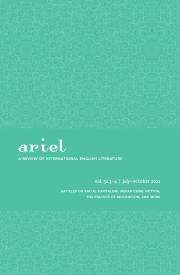Neoliberal Capitalism in the Indian Organized Crime Fiction of Vikram Chandra and Salman Rushdie
Keywords:
organized crime and capitalism, organized crime in Indian fiction, Vikram Chandra, Salman Rushdie, neoliberalism in literatureAbstract
Close study reveals the systemically interwoven nature of the criminal and licit sectors of capitalist economies, yet capitalist society seeks to legitimize the latter sector by attempting to hegemonically externalize or Other the former, often by associating it with stigmatized minority and/or immigrant groups who are blamed for all of society’s ills in a way that allows the capitalist ownership class to falsely pass itself off as virtuous and free of the taint of association with criminal elements or having engaged in criminal acts itself. There is a systematic socio-cultural denial of the fact that capitalism produces all forms of conceivable capitalist accumulation, regardless of whether they accord with received notions of morality or legality. This essay argues that Vikram Chandra’s Sacred Games and Salman Rushdie’s novels The Moor’s Last Sigh and The Golden House seek to challenge this hegemonic Manichean conceptualization of crime and capitalism by thematizing the close relationships between capitalism and organized criminality in India. In the face of a socio-economic system whose spiraling material inequalities are eroding democracy and fueling the rise of fundamentalist nationalisms, these novels offer a counter to the hegemonic legitimizing narratives that present success within the world of neoliberal capitalism as a function of meritocratic entrepreneurialness, and they allow for a systemic perspective on organized crimes in resistance to the doxa that sees various criminal acts and capitalist successes as wholly discrete, disparate phenomena.


